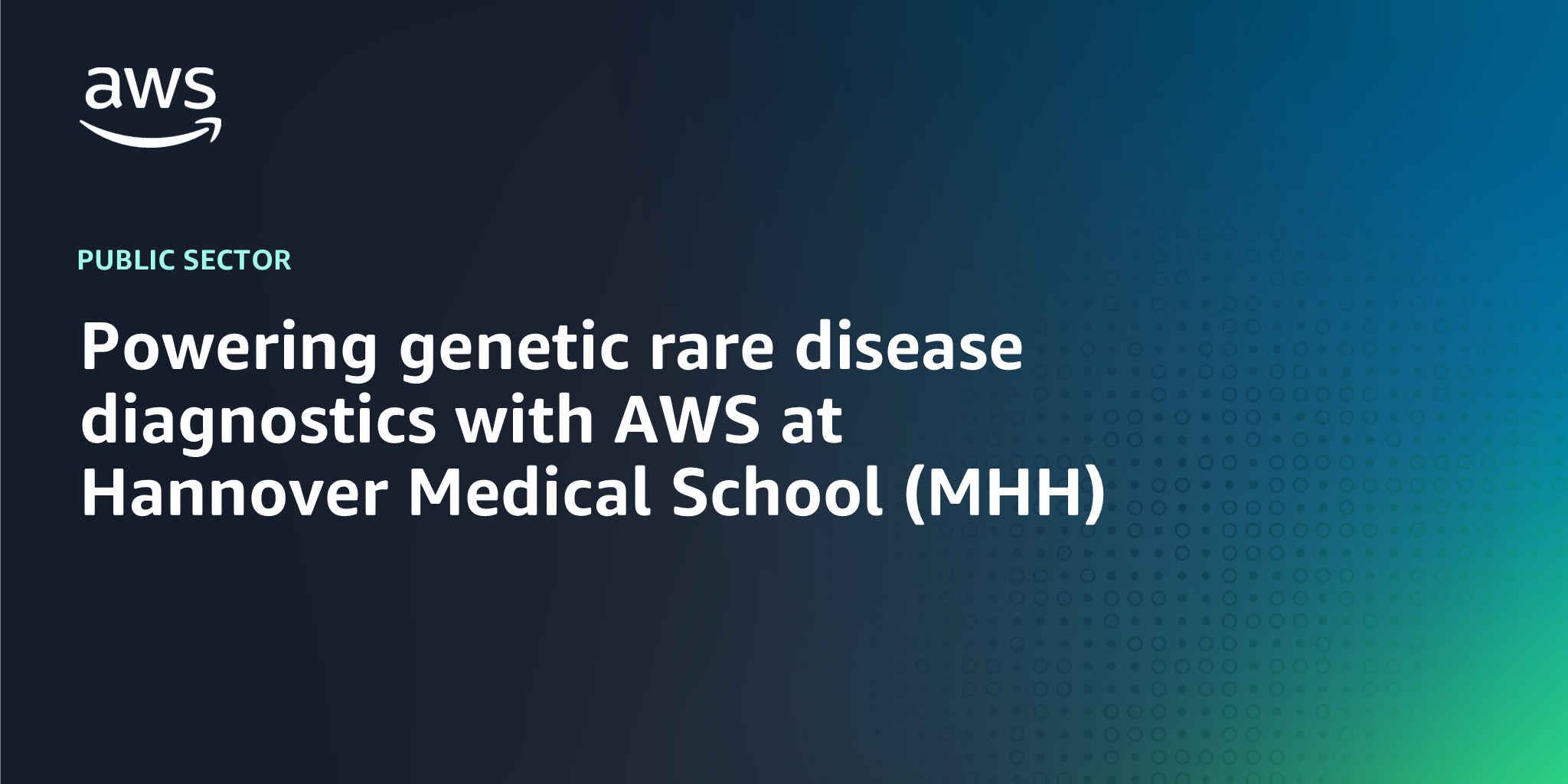AWS Public Sector Blog
Powering genetic rare disease diagnostics with AWS at Hannover Medical School (MHH)
The Whole Genome Sequencing (WGS) based genetic diagnostics has revolutionized our ability to identify and understand rare diseases, particularly in pediatric cases where early diagnosis, sometimes within a few hours to days, can dramatically improve patient outcomes. Along with the diagnostics focused workloads, academic medical centers (AMCs) also conduct various research projects to advance our understanding of clinical genomics. However, WGS needs significant computational resources for analyzing genomic data, which presents a challenge to AMCs to balance between flexibility, scalability, speed, and cost. The Department of Human Genetics at Hannover Medical School (MHH), one of Germany’s leading university hospitals, has developed an innovative solution to this challenge by using Amazon Web Services (AWS).
Solution overview
Like many human genetics departments, MHH operates state-of-the-art Illumina sequencing devices, such as the NovaSeqX with its onboard DRAGEN analysis pipeline for routine diagnostics. However, approximately 5 percent of their samples need re-analysis or more customized analysis with different configurations or additional pipelines. To address this need, MHH has implemented a flexible cloud-based solution. During the review of a patient’s genomics data, geneticists and bioinformaticians can trigger this re-analysis.
Through a simple Nextflow workflow, the specific sequencing data can be uploaded to Amazon Simple Storage Service (Amazon S3), and further analyzed with Amazon Elastic Compute Cloud (Amazon EC2). The workflows include the use of Illumina’s DRAGEN on AWS Marketplace and are orchestrated by AWS Batch, using containers stored on Amazon Elastic Container Registry (Amazon ECR). The cloud-hosted workflow complements NovaSeqX’s DRAGEN on-board capabilities and maintains the full compatibility and comparability across different analysis platforms, while making sure that their routine diagnostic workflow remains uninterrupted.
Benefits
The solution’s real power becomes evident when facing large-scale re-analysis projects. Every few years, when the human genome reference receives an update, hospitals need to reprocess thousands of previously sequenced genomes and update their institutional databases. Moreover, research projects can create additional temporary peak workloads. AWS-hosted genomics analysis workflows enable MHH to accommodate these non-routine projects whenever needed, scaling their analysis capacity independently of their routine diagnostic infrastructure. The solution presents another opportunity for MHH to route priority cases, such as those in pediatric care with life threatening unclarified conditions, to the cloud-hosted workflow using extra-large instances, cutting the processing time by up to 4–8 times to about an hour per sample.
Cost effectiveness was considered in MHH’s decision-making process. The secondary analysis of a 35 times human genome using DRAGEN on AWS Marketplace and custom workflows costs approximately $20 per analysis on a pay-as-you-go basis at the per-run level, without another yearly commitment or license costs. This pricing model was identified as suitable for handling variable workloads and special projects.
Security and data privacy are essential in genetic diagnostics. The cloud implementation at MHH uses the AWS built-in data privacy and security practices with existing C5 attestation, which is needed for handling healthcare data in Germany. The environment is isolated within the AWS EU (Frankfurt) Region addressing data residency requirements. The implementation, when combined with appropriate patient consent for cloud infrastructure hosting, fully complies with German laws and requirements for healthcare data privacy.
Conclusion
For human genetics departments considering similar modernization of their analysis infrastructure, MHH has implemented a solution where cloud computing functions alongside existing on-premises capabilities. The setup provides flexibility to handle both routine and special analyses, scaling capacity for large reprocessing projects, a transparent pay-per-use cost model, and security features relevant for university hospitals and genetic diagnostic centers.
This hybrid approach to genetic analysis infrastructure represents a forward-thinking solution to the evolving needs of modern human genetics departments. It provides the agility needed to maintain high diagnostic standards, while efficiently managing the growing computational demands of genetic diagnostics and research.
Resources
Learn more about AWS’ portfolio for Genomics and Multiomics workloads.
Get details about Illumina DRAGEN, implementing DRAGEN on AWS Batch, and Illumina Connected Analytics.
Find more about DRAGEN workflows on AWS and leveraging Illumina software for Multiomics Data Analysis.
Discover innovation and customer stories on AWS in Germany and learn about AWS European Sovereign Cloud.
